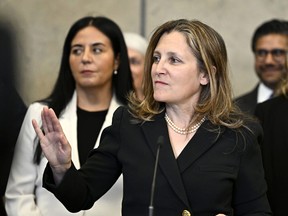A Growing Divide in Global Trade Relations
As tensions between Western countries and China continue to escalate, Canada’s finance minister, Chrystia Freeland, has hinted that the country may take a more robust stance against Chinese-made vehicles. In an interview with Bloomberg News, Freeland suggested that talks next week with business and labour groups could lead to the erection of trade barriers against Chinese electric vehicles (EVs). Furthermore, she hinted that these measures might extend beyond autos.
A Broader Consultation on Trade Practices
The Canadian government’s public consultation on how to respond to "unfair Chinese trade practices" in the EV sector has sparked concerns among business leaders and labour unions. The consultation is seen as a first step towards implementing higher tariffs on Chinese-made vehicles, which could harm Canada’s trade relationship with China.
Unfair Trade Practices: A Growing Concern
The Canadian government has been closely watching the Biden administration’s moves to impose higher tariffs against Chinese EVs, solar cells, batteries, steel, and other products. Freeland emphasized that Canada views its trading relationships through a national security lens, given the increasing importance of secure supply chains.
"The geopolitics and geoeconomics is back," she said. "That means that Western countries – and very much the U.S. – is putting a premium on secure supply chains and taking a different attitude towards Chinese overcapacity."
Canada’s Role in Global Trade
Freeland acknowledged that China’s entry into the World Trade Organization (WTO) more than two decades ago was a significant turning point in global trade relations.
"I see that Leninist precept in Chinese economic policy – of dominating the commanding heights of the global economy and acting quite intentionally to undermine and cut out Western competitors," she said. "I think it’s high time for us to be clear-eyed about that."
Domestic Pressures on the Canadian Government
The Canadian government is facing increasing pressure from domestic stakeholders to put up barriers to Chinese electric vehicles. The auto industry is pushing for protectionist measures to safeguard local jobs and wages, which they argue are threatened by cheaper Chinese products.
"For me, labour is a very important piece of the puzzle there, and I think it’s high time," Freeland said. "China is a centrally planned communist economy and China has an intentional, state-directed policy of overcapacity."
Implications for Canada-China Relations
The Canadian government has been at odds with China on several fronts, including the arrest of Huawei executive Meng Wanzhou on a U.S. extradition warrant. China retaliated by detaining two Canadian citizens for nearly three years.
The current tensions between Canada and China have raised concerns about the impact on trade relations between the two countries. Freeland’s comments suggest that Canada may take a more assertive stance against Chinese trade practices, which could further strain relations with its second-largest trading partner.
Conclusion
As global trade relations continue to evolve, Canada’s finance minister has hinted at expanded trade action against China. The country’s consultation on unfair Chinese trade practices and potential tariffs on EVs have sparked concerns among business leaders and labour unions. The implications of these measures will be closely watched by stakeholders in both Canada and China.
Sources:
- Bloomberg News
- Canadian government announcements
- Industry reports and analysis
Related Articles:
- "Freeland Optimistic for ‘Win-Win Outcome’ in Digital Sales Tax"
- "Freeland Gets Ball Rolling on New Tariffs for Chinese EVs"
Join the Discussion:
- Share your thoughts on Canada’s stance against Chinese trade practices.
- How do you think these measures will impact global trade relations?
- What are the implications of China’s state-directed economic policies?
